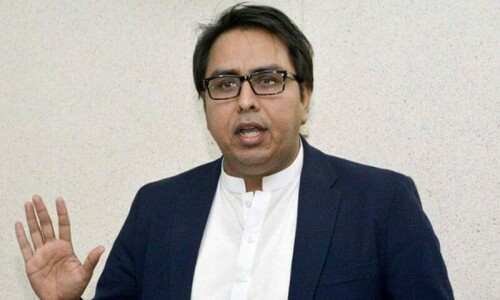The latest issue of the monthly Punjabi includes the November 1951 issue of the magazine which had carried Punjabi articles of three editors of national Urdu dailies i.e., Hameed Nizami (Nawa-i-Waqt), Maulana Abdul Majeed Salik and Maulana Akhtar Ali Khan (Zamindar). The 1951 issue also carried the article of two other writer-journalists -- Saqib Zeervi (editor weekly Lahore) and Abdul Majeed Bhatti (editor Himayat-i-Islam).
Akhtar Ali Khan was then president of Pakistan Newspapers Editors Conference. Hameed Nizami, editor of Nawa-i-Waqt, contributed an article titled “Punjab di Ibtadaee Ta’leem” which still demands support from his own publishing house being headed by his younger brother, Majeed Nizami, and from his son, Arif Nizami, now editor of daily Pakistan Today.
What Hameed Nizami wrote in 1951 still needs the attention of the Punjab government, particularly its education ministry. Mr Nizami was not alone but there were others also who demanded due place for Punjabi in educational system. Faiz Ahmad Faiz and Ahmad Nadeem Qasmi and octogenarian editor Maulana Zafar Ali Khan also contributed articles on Punjabi language issue in the Punjabi.
The most interesting and detailed article was contributed by Hameed Nizami, which has been reproduced in the latest issue of the magazine being edited by Junaid Akram.
Hameed said: “Though it is difficult to discuss the merit, importance and need of the Punjabi language in this small article, what I want to say is that no nation can progress without the development of its mother tongue.
“That does not mean that Urdu and Punjabi are rival languages. There is no enmity between them. In my house Urdu is spoken all day and night (chovi ghantey). My wife had studied 10-12 years at Aligarh. She is from Punjab but she speaks Urdu. My own job is in Urdu. We speak Urdu in our house. My friends and relatives also talk to their children in Urdu. But when I started testing my children on their spoken styles, I noted a novel thing that my child while speaking very fluent Urdu suddenly stops. The reason is that he knows the appropriate word (of Punjabi) but he does not know its equivalent in Urdu therefore he stops with the jerk.
“Whenever I talked to him in Punjabi he never fumbled and expressed himself very fluently. I was wonderstruck because we never talked to our children in Punjabi. We never spoke to them in Punjabi but from where they have learned Punjabi in which they are more fluent than Urdu. Now I stand convinced that Dr Baqir is right that small children should be imparted early education in their mother tongue.”
In the same article, Hameed wrote: “Among the learned family of the Punjab about 90 per cent still speak Punjabi in their homes. It is just natural that we cannot live without this language and so far the education of children is concerned it must be in their mother tongue. The language other than mother tongue used as medium of instruction taxes the mind of the children. His growth stagnates.”
Hameed wrote at least three articles in Punjabi and in one of them he critcised the dogmatic linguistic attitude of Urdu-speaking conformists. He advised them not to assert the version of Delhi and Lucknow accents but try to compromise with the version going to emerge in this new country. This he said in his article published in the issue of Punjabi of January 1952.
Hameed Nizami started his career not as a teacher but as a journalist. On the other hand, Faiz Ahmad Faiz was a teacher of a foreign language... English, having interest in writing poetry. He also wrote in Urdu which he studied up to matric. In those days Urdu was not compulsory at college level therefore he did his master’s in Arabic while at graduation level he studied Persian. Punjabi was out-of-bound for Punjabis. All doors of educational institutions were closed except for non-Muslims particularly for Sikhs who have their own script, Gurmukhi.
Faiz never wrote any thing for Punjabi monthly; perhaps he was not approached by Dr Faqir, then founder editor. Somehow most of the progressive writers were avoided for reasons not known. On the other hand, it were the progressive writers who principally supported the cause of regional languages which at that time were strongly opposed by the rightists. But Faiz supported teaching in mother tongue and while in Hyderabad Jail he in one of his letters to Alys asserted the importance of the people’s languages.
In 1970 the Punjabi Adabi Sangat sent a memorandum to President Yahya Khan and chairman of the Task Force Committee on education, Air Marshal Noor Khan in which it was pleaded that in the Punjab, Punjabi be introduced as medium of instruction. Faiz was among 200 prominent writers, journalists, writers, teachers, lawyers and intellectuals of the Punjab, who signed the memorandum.
The text of the memorandum and the name of the signatories were published by the monthly Punjabi Adab in its special issue on education. It also carried the articles in which writers like Altaf Gohar, then secretary information, and Dr Syed Abdullah, principal Oriental College, had dubbed the protagonists of Punjabi as anti-state, pro-India and pro-Russia.
Another editor, columnist, writer and poet Ahmad Nadeem Qasmi had outrightly supported the cause of the Punjabi language and literature. He also signed the memorandum mentioned above. But much before he had written many times in favour of Punjabi and demanded that it be introduced as medium of instruction at least at the primary level. At the fag end of his life he wrote a very emotional column in a national daily in which he urged the government to fulfill his last wish… teaching of Punjabi at primary level. But who cares for them?














































Dear visitor, the comments section is undergoing an overhaul and will return soon.